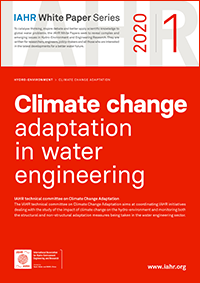[Publications update] White Paper on climate change adaptation in water engineering
 To catalyse thinking, inspire debate and better apply scientific knowledge to global water problems, the IAHR White Papers seek to reveal complex and emerging issues in Hydro-Environment and Engineering Research. They are written for researchers, engineers, policy-makers and all those who are interested in the latest for a better water future.
To catalyse thinking, inspire debate and better apply scientific knowledge to global water problems, the IAHR White Papers seek to reveal complex and emerging issues in Hydro-Environment and Engineering Research. They are written for researchers, engineers, policy-makers and all those who are interested in the latest for a better water future.
The community of professionals, stakeholders and end-users in the water engineering sector is concerned about the observed and projected impact of global warming and related changes on the water cycle. Little doubt exists about the fact that the observed global temperature increase is already impacting some components of the hydrosphere, the most evident one being the cryosphere with the retreat of ice masses.
We must rethink our approach to designing hydraulic structures and managing water resources in the most climate-sensitive environments, such as coasts and islands, mountain areas, rapidly developing mega-cities, and high-latitude tundra with permafrost. At the same time, we need to strengthen our scientific efforts in monitoring and understanding the impact of global warming on the water systems.
In this white paper, Roberto Ranzi, Professor of Hydraulic structures and River basin monitoring and restoration at the University of Brescia, Italy, and chair of the IAHR technical committee on Climate Change Adaptation, addresses some of the key approaches and challenges associated with climate change adaptation in water engineering.
>> IAHR White Paper: Climate change adaptation in water engineering